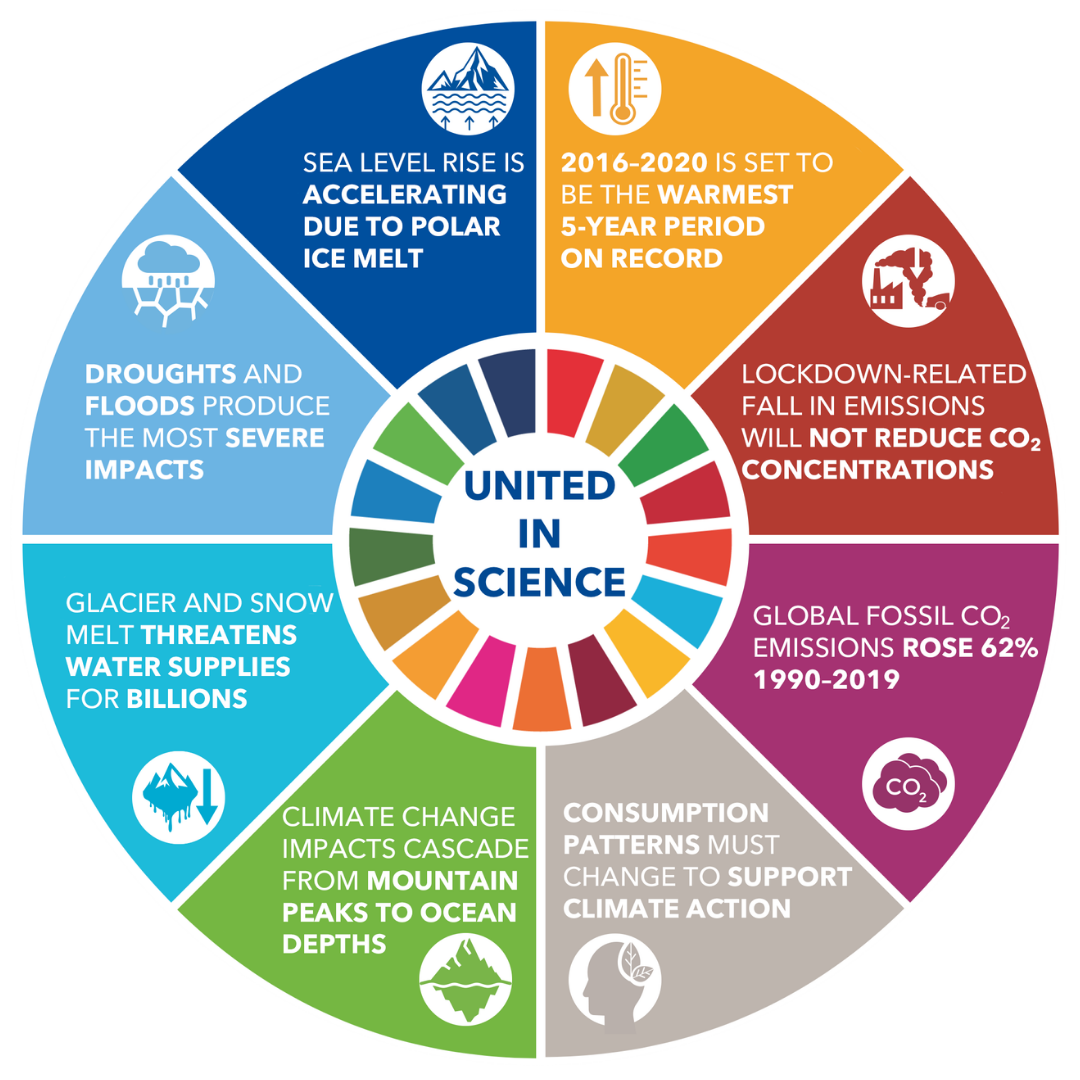This is according to a new multi-agency report from leading science organizations, United in Science 2020. It highlights the increasing and irreversible impacts of climate change, which affects glaciers, oceans, nature, economies and human living conditions and is often felt through water-related hazards like drought or flooding. It also documents how COVID-19 has impeded our ability to monitor these changes through the global observing system.
“This has been an unprecedented year for people and planet. The COVID-19 pandemic has disrupted lives worldwide. At the same time, the heating of our planet and climate disruption has continued apace,” said UN Secretary-General António Guterres in a foreword.
“Never before has it been so clear that we need long-term, inclusive, clean transitions to tackle the climate crisis and achieve sustainable development. We must turn the recovery from the pandemic into a real opportunity to build a better future,” said Mr Guterres, who will present the report on 9 September. “We need science, solidarity and solutions.”
The United in Science 2020 report, the second in a series, is coordinated by the World Meteorological Organization (WMO), with input from the Global Carbon Project, the Intergovernmental Panel on Climate Change, the Intergovernmental Oceanographic Commission of UNESCO, the UN Environment Programme and the UK Met Office. It presents the very latest scientific data and findings related to climate change to inform global policy and action.
“Greenhouse gas concentrations - which are already at their highest levels in 3 million years - have continued to rise. Meanwhile, large swathes of Siberia have seen a prolonged and remarkable heatwave during the first half of 2020, which would have been very unlikely without anthropogenic climate change. And now 2016–2020 is set to be the warmest five-year period on record. This report shows that whilst many aspects of our lives have been disrupted in 2020, climate change has continued unabated,” said WMO Secretary-General, Professor Petteri Taalas.

Highlights from the Key Findings
Earth System Observations during COVID-19 (Intergovernmental Oceanographic Commission of UNESCO and WMO)
The COVID-19 pandemic has produced significant impacts on the global observing systems, which in turn have affected the quality of forecasts and other weather, climate and ocean-related services.
The reduction of aircraft-based observations by an average of 75% to 80% in March and April degraded the forecast skills of weather models. Since June, there has been only a slight recovery. Observations at manually operated weather stations, especially in Africa and South America, have also been badly disrupted.
For hydrological observations like river discharge, the situation is similar to that of atmospheric in situ measurements. Automated systems continue to deliver data whereas gauging stations that depend on manual reading are affected.
In March 2020, nearly all oceanographic research vessels were recalled to home ports. Commercial ships have been unable to contribute vital ocean and weather observations, and ocean buoys and other systems could not be maintained. Four full-depth ocean surveys of variables such as carbon, temperature, salinity, and water alkalinity, completed only once per decade, have been cancelled. Surface carbon measurements from ships, which tell us about the evolution of greenhouse gases, also effectively ceased.
The impacts on climate change monitoring are long-term. They are likely to prevent or restrict measurement campaigns for the mass balance of glaciers or the thickness of permafrost, usually conducted at the end of the thawing period. The overall disruption of observations will introduce gaps in the historical time series of Essential Climate Variables needed to monitor climate variability and change and associated impacts.
The Ocean and Cryosphere in a Changing Climate (Intergovernmental Panel on Climate Change)
Human-induced climate change is affecting life-sustaining systems, from the top of the mountains to the depths of the oceans, leading to accelerating sea-level rise, with cascading effects for ecosystems and human security.
This increasingly challenges adaptation and integrated risk management responses.
Ice sheets and glaciers worldwide have lost mass. Between 1979 and 2018, Arctic sea-ice extent has decreased for all months of the year. Increasing wildfire and abrupt permafrost thaw, as well as changes in Arctic and mountain hydrology, have altered the frequency and intensity of ecosystem disturbances.
The global ocean has warmed unabated since 1970 and has taken up more than 90% of the excess heat in the climate system. Since 1993 the rate of ocean warming, and thus heat uptake has more than doubled. Marine heatwaves have doubled in frequency and have become longer-lasting, more intense and more extensive, resulting in large-scale coral bleaching events. The ocean has absorbed between 20% to 30% of total anthropogenic CO2 emissions since the 1980s causing further ocean acidification.
Since about 1950 many marine species have undergone shifts in geographical range and seasonal activities in response to ocean warming, sea-ice change and oxygen loss.
Global mean sea-level is rising, with acceleration in recent decades due to increasing rates of ice loss from the Greenland and Antarctic ice sheets, as well as continued glacier mass loss and ocean thermal expansion. The rate of global mean sea-level rise for 2006–2015 of 3.6 ±0.5 mm/yr is unprecedented over the last century.
Notes to Editors:
This report has been compiled by the World Meteorological Organization (WMO) under the direction of the United Nations Secretary-General to bring together the latest climate science related updates from a group of key global partner organizations – WMO, Global Carbon Project (GCP), UNESCO Intergovernmental Oceanographic Commission (UNESCO-IOC), Intergovernmental Panel on Climate Change (IPCC), UN Environment Programme (UNEP) and the Met Office. The content of each chapter is attributable to each respective organization. The report is available electronically at: public.wmo.int/en/resources/united_in_science
For further information, please contact:
WMO, Clare Nullis, Media Officer. Email cnullis@wmo.int(link sends e-mail). Tel 41-79-7091397
Global Carbon Project https://www.globalcarbonproject.org
UNESCO’s IOC, Vinicius Lindoso, Communications Officer. Email v.lindoso@unesco.org(link sends e-mail) Tel 33-0145681170
IPCC ipcc-media@wmo.int(link sends e-mail)
UNEP Keishamaza Rukikaire, Head of News and Media, rukikaire@un.org(link sends e-mail)
UK Met Office pressoffice@metoffice.gov.uk(link sends e-mail)
This article is adapted from the original press release issued by WMO and available at: https://public.wmo.int/en/media/press-release/united-science-report-climate-change-has-not-stopped-covid19
